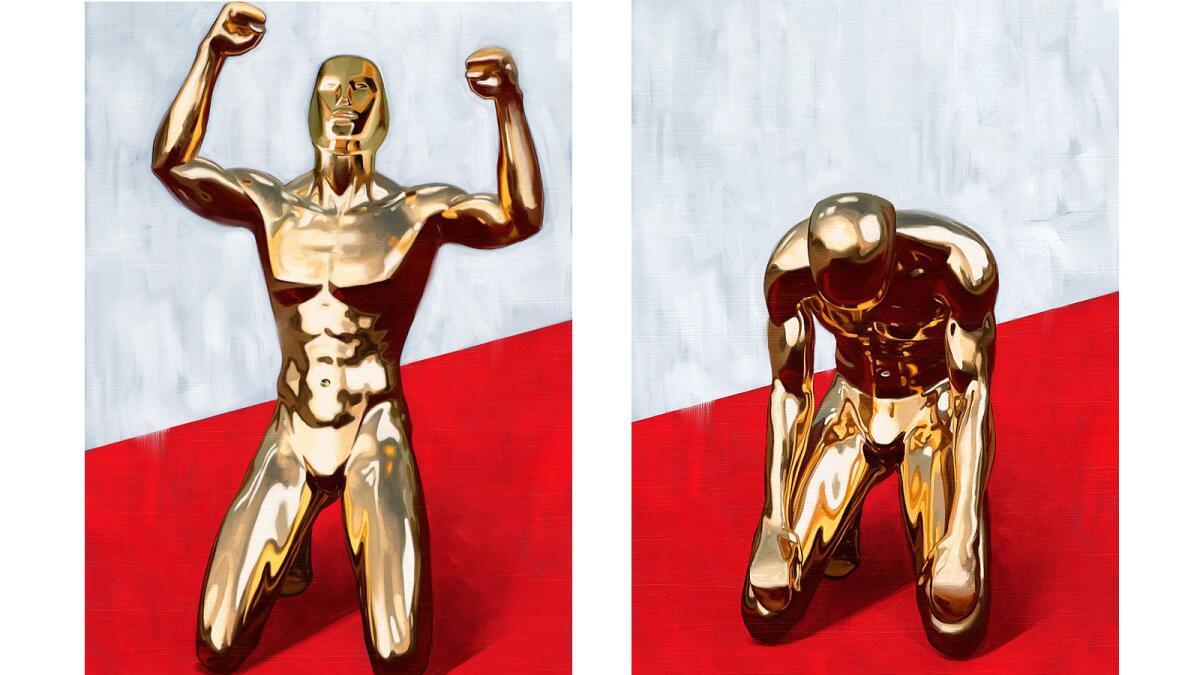Commentary: Why the Oscars still matter
- Share via
It happens every year and involves a certain academy and a group of gold-plated statuettes. No, I’m not talking about the Oscars themselves, but rather the question of whether these venerable awards, clocking in at 90 years and counting, are still relevant.
On one level, asking whether something a decade away from a century can continue to matter in a youth-obsessed culture, where something that’s lasted four score and 10 years might as well date from the Mesozoic era, is going to be inevitable.
But given the enormous upheavals that are currently engulfing the movie business — the issues of representation on screen and endemic sexual abuse among them — that query comes up with added ferocity this time around. If, as Gil Scott-Heron predicted, the revolution will not be televised, why worry about the Oscars?
One reason to pay attention, not to be too reductive about it, is that if the Oscars truly were passé, no one would take the time to worry if they still mattered. The fact that the question is asked is partial confirmation of significance.
But much more than that is involved. Paradoxically, for reasons both long term and immediate, the Oscar feels especially of interest and significant this of all years.
Why the Oscars have lost their mojo — and their relevance »
For openers, because the Oscars have been around so long they serve as a one-of-a-kind yardstick, an indicator of what the Hollywood community values now and in the past.
The awards don’t represent any absolute standard of excellence or quality and they never have. Rather, they demonstrate the particular taste of a finite group of people at a specific point in time.
The Oscars continue to mean something because they’re given by an amalgamation of people from different crafts who work together to actually make movies. And, rather than acting entitled, members take their responsibility seriously, doing the heavy lifting seeing all the nominated films requires.
Although the group’s taste is not always mine, what it has to say matters because it’s speaking from a place of knowledge and experience, and that continuum is part of what keeps the award relevant. Like few other things in the sensation-a-minute Hollywood universe, the Oscars endure.
Though it has cut into theatrical viewing, the omnipresence of DVD screeners and the likely future streaming of contenders, by making it easier for voters to follow their taste into the world of independent, non-studio film, has turned the Oscars into a more accurate reflection of where we are today.
I’ve also discovered that questions of continued relevance are more of a local concern than they are a global one. In a world where international connection is increasingly essential, that’s something worth considering.
As an example, I remember the opportunity I had to interview the Polish director Andrzej Wajda, his country’s most significant and politically involved filmmaker, when he won an honorary Oscar in 2000. Wajda was grateful for the award, and he pointedly told me the Polish government planned to put it on public display next to Lech Walesa’s Nobel Prize for Peace.
The main reason the Oscars remain relevant is also rooted in recent history, in the controversy over the makeup of the academy and the organization’s concerted attempt to rectify the situation. The group didn’t just worry, it acted, adding more than 1,400 new members in the past few years.
Having a more representative electorate undoubtedly contributed to this year’s nominations. In years past, it is hard to imagine as creature feature-based an item as “The Shape of Water” leading all comers with 13 nominations.
And equally hard to imagine having the thoroughly genre “Get Out” and the scathing “Three Billboards Outside Ebbing, Missouri” gradually emerging as possible upset winners if an upset is in the offing. Having top contenders that are plugged into the zeitgeist has given the Oscars as much relevance as they have ever had in recent years.
Complete list of 2018 Academy Awards nominations »

90th Oscars Red Carpet rollout on Hollywood Blvd. (Video by Al Seib/Los Angeles Times)
Just as I was finishing up this piece, I opened an email that underlined the unexpected extent of Oscar interest worldwide.
Holidu.com, a web site based in Munich, Germany, that describes itself as “a leading global search engine for vacation rentals,” sent out a press release headlined “Oscar-worthy vacations: Stay at Oscar-winners homes,” which includes Bette Davis’ place in New Hampshire and the L.A. house “where Orson Welles wrote ‘Citizen Kane.’” I just might want to try one of those out, and I’ll wager I’m not the only one.
On a more ambivalent note, I sometimes think that questions of Oscar relevance are really covert dismissals of the significance of Hollywood and the kind of movies the Oscars are all about, films that often (but not inevitably) have eight- or even nine-figure budgets and unashamedly aim for mainstream acceptance.
In this context I remember hearing Frank Pierson, the Oscar-winning screenwriter of “Dog Day Afternoon,” talk about how he and his wife spent the night of September 11, 2001.
Terribly disturbed, as everyone was, by the day’s events, Pierson and his wife decided to watch a film at home, and what they selected was “Singin’ in the Rain,” classic Hollywood entertainment guaranteed to lift your spirits even if you’re facing what looks to be Armageddon.
An event that celebrates an art form this powerful, which is finally what the Oscars does, will always have a place in our world.

More to Read
Only good movies
Get the Indie Focus newsletter, Mark Olsen's weekly guide to the world of cinema.
You may occasionally receive promotional content from the Los Angeles Times.










